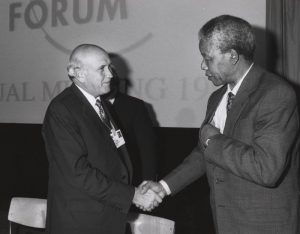Nelson Mandela was an important political figure in South Africa who fought against apartheid, a system of racial segregation. He was also the first black president of South Africa, serving from 1994 to 1999. In 1993, Nelson Mandela was awarded the Nobel Peace Prize together with then-President Frederik Willem de Klerk, the man who released him. The Nobel Peace Prize is one of the most prestigious awards in the world. It is awarded to individuals who have significantly contributed to peace and humanity. The award comes with a medal, a diploma, and a cash prize.
The Nobel Committee decided to name them joint recipients of the 1993 Nobel Peace Prize for their efforts to bring an end to apartheid in South Africa. The two prize-winners, one from the side of the oppressors and the other from the side of the suppressed, have taken steps to break out of their country’s violent cycle. Mandela and de Klerk opted for reconciliation rather than dragging on a bloody civil war. They had agreed on a peaceful transition to majority rule, which laid the groundwork for a new democratic nation.
Francis Sejersted, the Chairman of the Norwegian Nobel Committee, said that the policy of reconciliation advocated by Nelson Mandela and Frederik de Klerk had been decisive in creating a new South Africa. He added that what they had shown “provides hope not only for South Africa; it is also a shining example for the world that there are ways out of the vicious circle of violence and bitterness.” These are two men who have had the courage to set an example and who, in doing so, have changed the course of history in South Africa.
Mandela’s Nobel Lecture
Nelson Mandela held his Nobel Lecture on the 10th of December 1993 in the City Hall of Oslo, Norway. In his acceptance speech, Nelson Mandela spoke about the need for forgiveness and reconciliation in order to achieve lasting peace. He also stressed the importance of democracy, human rights, and equality. One of the key points of Mandela’s speech was that every person has the right to live and practice a democratic and fair justice system. He called for the end of violence around the world and shared his vision for a future where people of all races could live together in peace and harmony.
Mandela also used his Nobel Lecture to pay tribute to the South Africans who were awarded the Nobel Peace Prize before him, such as Chief Albert Luthuli, who was the previous President of the African National Congress, and Archbishop Desmond Tutu, who was a prominent anti-apartheid activist. He spoke about how each of them had contributed to the struggle against apartheid and the fight for a democratic South Africa. He mentioned Rev. Martin Luther King, Jr. as well, a recipient of the 1964 Nobel Peace Prize for his work in the civil rights movement in the United States. King’s “I Have a Dream” speech inspired Mandela during his own struggle against apartheid.
He also congratulated F.W. de Klerk on his award, saying that the award he and de Klerk had received was not necessarily a recognition of their own worthiness but rather an acknowledgment of the value of the ideals for which they have fought. He expressed his hopes that he could work together with de Klerk to achieve a future in South Africa where children can live a life full of opportunities in a country that recognizes and protects their rights.
Mandela believed that there is a “rich reward in the making” but that this reward is not measured in money, rare metals, or precious stones but by the happiness and welfare of children, who are the most vulnerable citizens of any society. He said that it is every society’s duty to ensure children are “no longer tortured by the pangs of hunger” and are not subjected to abuse or exploitation. All children, regardless of race, should have access to food, shelter, education, and healthcare.
He concluded his speech by dedicating the award to all the people who had lost their lives in the struggle against apartheid and to those who were still fighting for freedom around the world. In a previous statement, he shared that after knowing he was a recipient of the award, he promised to continue his work to bring “peace, freedom, and justice for all to South Africa .”That promise shines through in his acceptance speech. He encouraged everyone to work together to build a just and peaceful world where people can live together in harmony regardless of race or ethnicity. In his own words, “Let a new age dawn!” Nelson Mandela’s Nobel Lecture is an important reminder of the power of forgiveness and reconciliation in the face of violence and oppression. It is a call to action for everyone to work together to build a more peaceful and just world.
